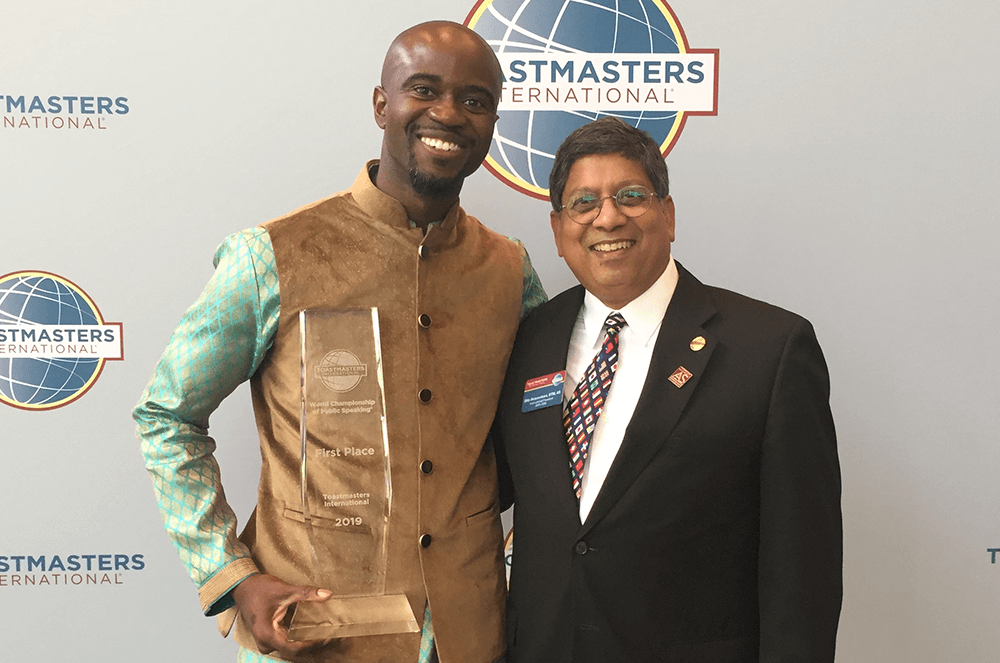
Attendees at the 2025 Toastmasters International Convention, held in August in Philadelphia, Pennsylvania, were encouraged to “Envision Y(our) Next Move” and focus on the future, for themselves and the organization.
If the World Championship of Public Speaking® is any indication, the future looks very enjoyable indeed. The top three winners all wove humor and laughter into their speeches, winning over the audience and the judges.
The event is the final stage of the International Speech Contest, which begins with competitions in clubs around the world. Winners advance through the Area, Division, District, quarterfinal, and semifinal contests.
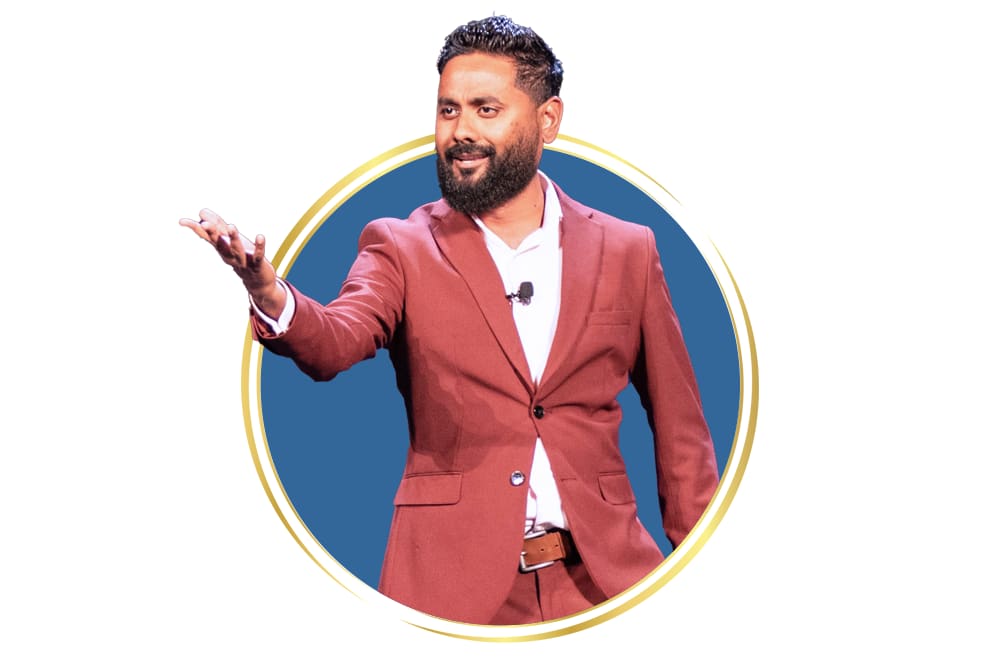
Sabyasachi Sengupta
By Laura Amann
From the moment he stepped from behind the curtains, kneeled down, and literally kissed the stage, Sabyasachi Sengupta had the audience captivated. The 2025 World Champion of Public Speaking kept a sparkle in his eye and a lightness on his feet while delivering his humorous speech, Just Nod.
He wove together lively stories as he took the audience on his journey, starting with his desire to be a Bollywood performer, to his career in finance, to his realization that he could still “be a performer even in a boardroom.”
He peppered his points with humorous asides, ambiguous nods of his head, and expressive eye gazes.
Sengupta, a member of Fusion Toastmasters Amsterdam in the Netherlands, and who goes by Saby, clearly had fun onstage.
Dream of Winning
Much like all contestants in any type of contest, Sengupta has long dreamed of being the winner. However, in his case, he’s also lived it many, many times before actually living it, albeit in his mind.
He explains that he regularly and frequently manifested being on the World Championship stage, imagining those seven-and-a-half minutes, envisioning himself giving a great speech, making people laugh, and leaving them feeling happier and lighter than when they walked into the room.
“It’s something I’ve always visualized—what I’ll say, what I’ll do. I have choreographed this moment in my mind so many times over the last decade. But the real experience is 10 million times better,” he laughs.
He admits that even up to the moment he went onstage, he was still forgetting things as he went over his speech in his head. But as soon as he finished, he knew he had delivered the best version he could.
After his win, even while the excitement still swirled around him, Sengupta remained humble about the journey and realistic about his new title of World Champion.
“I’m very, very grateful,” he says. “But this whole time I also have been really trying to have a sense of detachment. I try to attach to things that are in my control—my speech, my performance, my energy—and detach from anything that’s out of my control: the outcome, how the audience might react.
“And so I’m extremely happy, but if I’m brutally honest, I’m also detached, because winning is great, but my role was to give my best performance.”
This perspective derives from a favorite quote of his, inspired by the Bhagavad Gita: “You are nothing more than a small molecule in this big universe. So you do your role. You do what you can do. You do your action to the best of your ability. And that’s all in your hand, all in your control.”
Journey to the Stage
Sengupta’s journey to the 2025 World Championship stage almost didn’t happen. In fact, he didn’t plan on competing this year at all. Two days before the club contest, he had just returned home after months of being away. Unbeknownst to him, the Vice President Education had signed him up to be a contestant that Wednesday.
So he adapted a speech he had previously given and came in second, which was enough to get him to the Area contest. He worked a little harder on that speech, and won. But at the Division contest, he started having coughing attacks, and wasn’t sure if he could compete at all. Somehow, he pulled it together and managed to speak for seven minutes with no coughs, and the road to the Philadelphia stage continued.
Sengupta joined Toastmasters in 2011, shortly after moving to the Netherlands, as a way to meet people. He held a few club officer roles before entering his first club contest in 2014. He knew right away that was where he needed to be.
He credits his older brother, Somaditya, with cultivating his success in speaking and onstage. Sengupta describes himself as a small, skinny kid who was often bullied. His brother saw something in him, and pushed him to participate in debates and deliver elocution speeches, starting as early as 9 or 10 years old. Even joining Toastmasters was his brother’s idea.
“He saw a winner in me when nobody in the world did. Without my brother pushing me from childhood to understand my strengths and believing those strengths, I would never have come this far in my life,” he reflects.
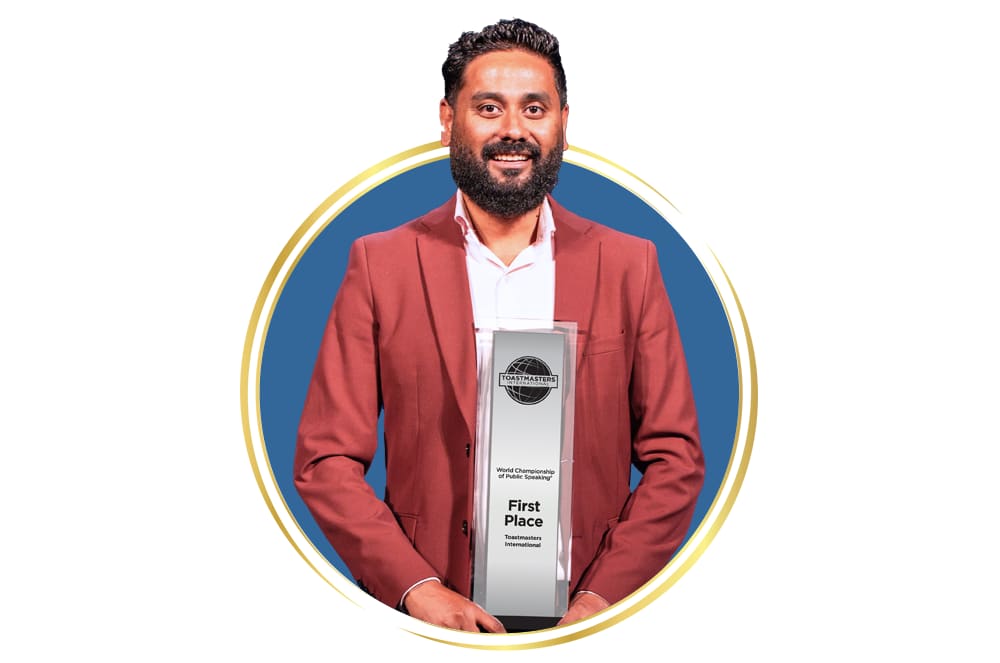
Preparing the Speech
Sengupta knew that delivering a humorous speech on the World Championship stage might be risky, noting that most speakers bring a seriousness to their message, and humorous speeches often aren’t recognized at the same level. And he tried writing a few of those speeches, but ultimately he realized he was trying to be somebody else.
So he leaned into his strength. “Humor is one way I can convey, connect, and even inspire an audience,” says Sengupta, who also gave a humorous speech in the semifinals.
“Why kill someone with a sword when you can win them over with a smile?” he adds. “I always follow that thought.”
His sense of humor was obvious before he even spoke a word. His opening kiss to the stage brought a big laugh and propelled him forward. He wanted to acknowledge the love of standing on a stage, whatever the size, something that Toastmasters would understand.
That kiss, however, was a last-minute addition, and a way of flipping the traditional speech opener of starting on a personal note.
It was one of many small adjustments that he made after becoming wracked by a bad case of self-doubt two weeks prior to the World Championship. He was suddenly feeling unsure about his semifinals speech and questioning parts of it. Fortunately, timely support came from his coaches and mentors, Aditya Maheswaran, DTM, of London, England, and John Zimmer of Geneva, Switzerland, both of whom offered more tips and encouragement.
“Nobody can win a speech contest without asking for help from someone,” Sengupta notes. “It takes a lot to learn to go to a mentor and ask for help; it’s a very beautiful and humbling experience.”
In the end, he decided to trust that he would deliver his best performance when the pressure was the highest.
“I just love the competition, the pressure, the preparation of contests,” Sengupta says. “It forces you to write a good speech. It forces you to think creatively. It teaches you humility, creativity, resilience, and also how to handle stress.”

Listen to The Toastmasters Podcast to hear more from Saby Sengupta.
Next Steps
Since his win, life has been a whirlwind of celebrations and opportunities he never dreamed of. While he has been soaking in his new reality of being a World Champion, Sengupta has also been busy in his career.
True to his speech’s message, he is finding ways to meld his presentation style with his professional life. He’s transitioning out of his career in finance, and building his own company—one that will focus on change management and team development, not through training sessions and lectures but through public speaking, improv theater, doodling, Legos. The company’s motto, Method in Madness, alludes to his belief that whoever has the most fun, always wins. “We can make people change, change behaviors, understand cultures,” he explains, “but we can do it in a fun way.
“I’m trying to bring my own little style, my little razzle dazzle, to the corporate world.”
Laura Amann is managing editor of the Toastmaster magazine.
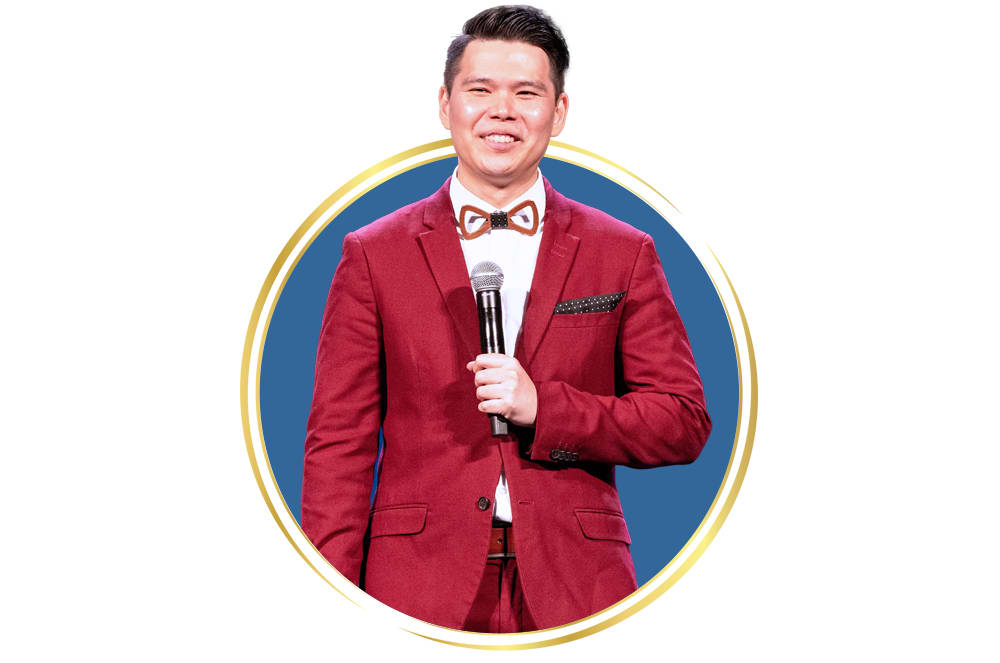
Mas Mahathir Bin Mohamad
By Laura Mishkind
If you think you’ve seen Mas Mahathir Bin Mohamad on the World Championship stage before, you’d be right. His signature maroon suit and bowtie appeared in Nashville, Tennessee, in 2022, when he won third place in the World Championship of Public Speaking. This year in Philadelphia, he advanced to runner-up.
Mahathir got his start with Toastmasters officially in 2016 and is currently a member of MII Toastmasters Club in Kuala Lumpur, Malaysia. He began competing in speech contests in 2017 and has advanced to the International Speech Contest semifinals four times.
He was first introduced to Toastmasters as a child. In Malaysia, his parents were (and still are) members, so public speaking practice runs in the family. Mahathir says it is nice to see how proud they are of him, and life lessons from his mother often inspire his speeches.
His 2025 speech, . . . Raindrops, tells the story of Mahathir’s time tutoring a boy at an orphanage at his mother’s urging. The two have a rocky start, but after a reminder from Mom that the student doesn’t have the parental support Mahathir benefits from, the relationship shifts. Mahathir discovers the impact showing kindness to others can have.
“Looking at the world that we live in today, we witness so much hopelessness, loneliness, violence, and the list goes on.” he says, explaining why the topic is so important to him. “I wanted to share this speech on the world stage because I believe we can make this world a kinder place for everyone, and it starts with us, it starts with one action, no matter how small.”
Mahathir’s tale of kindness was accompanied by hand gestures, body language, and snapping. The periods in his speech title were introduced as three snaps. Think “snap, snap, snap, raindrops.” The snaps played a role in the speech itself and served as a reminder to the audience how one small drop can have a ripple effect.
Asked about the decision to use a sound effect in his title, the second-place winner says being on the world stage allows for the opportunity to try something new. “I had doubts prior to finalizing this title too, but I decided to take the risk and see how it goes, and I’m really glad the Contest Chair Stefano [McGhee] was able to snap so well—better than I could!”
This choice was a self-implemented challenge for growth. Mahathir explains that in 2022, he didn’t expect to place third, but this year, he actively challenged himself to give it his all to see how far he could go. After learning he had qualified for the quarterfinals, he practiced his speech at more than 30 clubs around the world (in person in Malaysia and online in other countries) in just 30 days. “All of [the members] were kind, encouraging, and supportive to share their feedback,” he says.
The support continued in Philadelphia. “Before and after the contest, you would not believe how many people came up to us speakers just to share encouragement, kind words, affirmations. All of us semifinalists and finalists got so much love from everyone!” And the semifinalists became great friends too. Mahathir says sharing the stage with this group will be a key memory.
With this support and fond memories in mind, Mahathir is eager for future contest seasons. “I will compete as often as I can because I have two goals that continue to fuel me,” he explains. “One, to be the first Malaysian World Champion, to make not only my family proud, but also my country. Two, to keep growing and improving myself. Because I believe that the growth I get from competing definitely shapes me into a better storyteller, but an even better human being.”
Laura Mishkind is associate editor of the Toastmaster magazine.
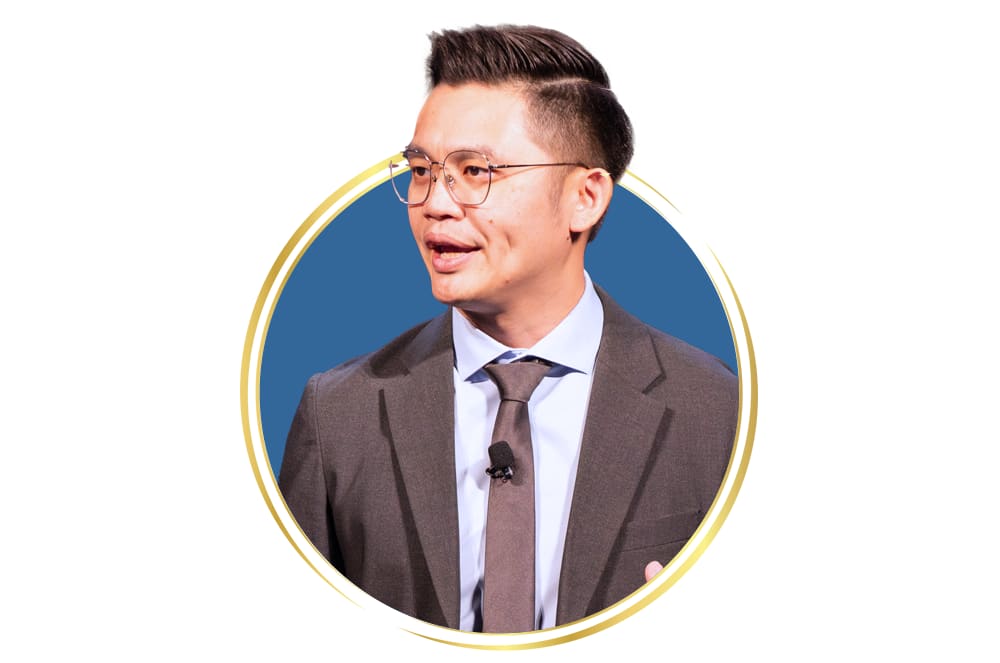
Allen Ang Boon Kiat, DTM
By Paul Sterman
He may not have become a basketball superstar like Allen Iverson, as he had once dreamed, but Allen Ang Boon Kiat, DTM, emerged a winner in Philadelphia nonetheless.
The communication coach and financial planner, from Seria, Brunei, scored a third-place finish at the 2025 World Championship of Public Speaking. His speech, titled Keep Dreaming, explored how his life goals and perceptions of success changed over time.
As a teenager, he told the audience, he loved basketball and idolized Iverson, who played for the Philadelphia 76ers in the National Basketball Association (NBA). Ang, miming flashy basketball moves in his speech, even changed his first name to “Allen.” He vowed that one day he would be an NBA player—never mind that he was 5 feet, 5 inches—and represent Brunei on a global platform.
It may not have happened the way he planned, but more than 25 years later, trading basketball for public speaking, the Bruneian flourished in Philly.
When he was announced as the third-place winner, “the moment felt surreal,” Ang recalls. “For me, it was closure to a childhood dream—representing my country on the world stage.”
A Toastmaster for 12 years, Ang is a past District 87 Director and a member of the Brunei Advanced Speakers club.
In his final-round speech, he mixed playful humor with poignant observations as he reflected on life changes. As a young man, once his basketball fantasy faded, Ang established a new plan: to be financially independent and retire by 40.
But reality interceded. He married, had two children, and experienced both ups and downs professionally, including losing two businesses during the pandemic. At 37, retirement looked a long way off.
At one point, beset by self-doubt, he asked his wife, Fen, if she was proud of him. Speaking softly in his speech, Ang shared how her loving words in that moment altered his perspective. Success, he realized, is not always measured by splashy achievements, but rather, by “the quieter dreams, the smaller dreams that have already come true”: being a good husband, a good father, a positive role model. And, as Fen pointedly reminded him, he had scored big by having “the most amazing and brilliant, intelligent woman as your wife.”
Indeed, Ang says his wife, who was in attendance at the championship, served as an excellent sounding board throughout his contest journey. “Her moral support and reassurance carried me through the last few months,” he says. His children, Angela, and Anson, too, were an inspiration.
In addition, his Toastmasters club was a great source of support.
“They made sure I had the personal space I needed without overwhelming me,” Ang says. “Before the finals, one member and close friend, Aziman, gave me the best reminder of all: Have fun.”
Paul Sterman is senior editor, executive and editorial content, for Toastmasters International.
The Toastmaster magazine staff is composed of four editorial team members. Learn more about them on the Staff page.



 Previous
Previous
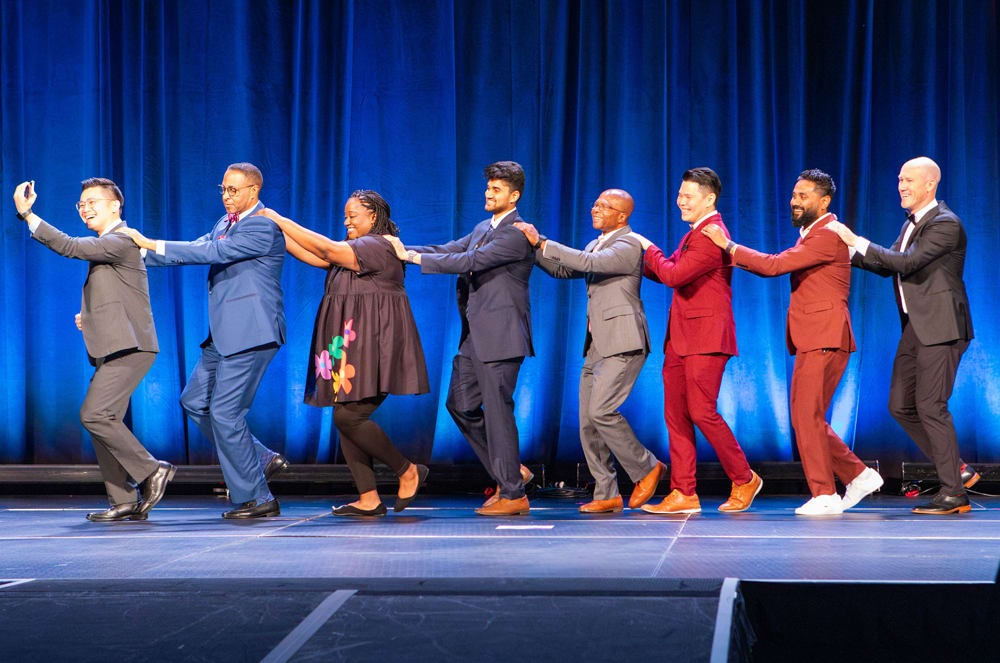
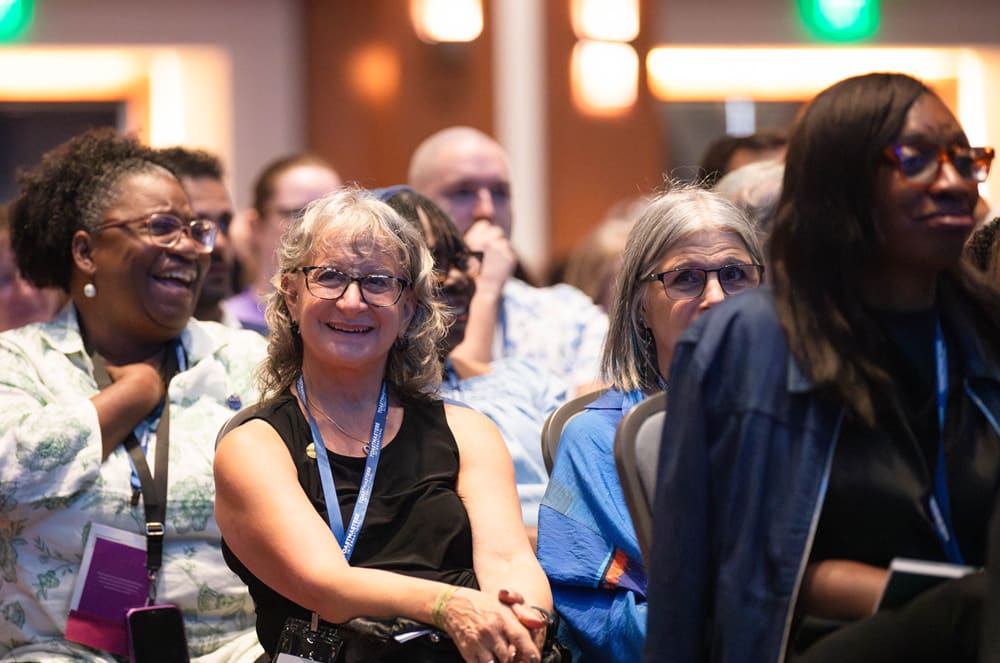
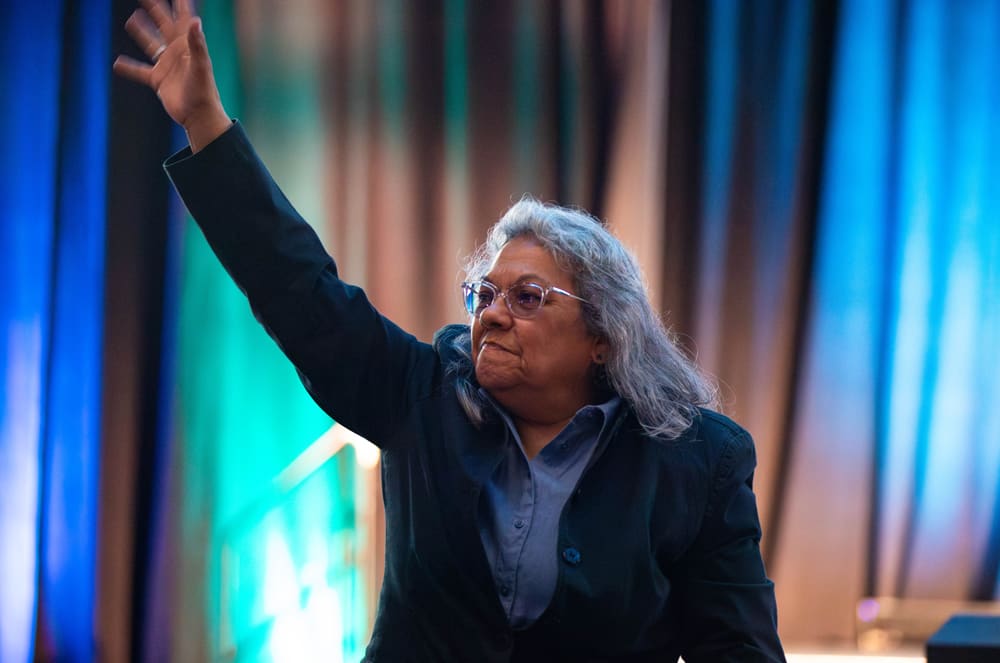
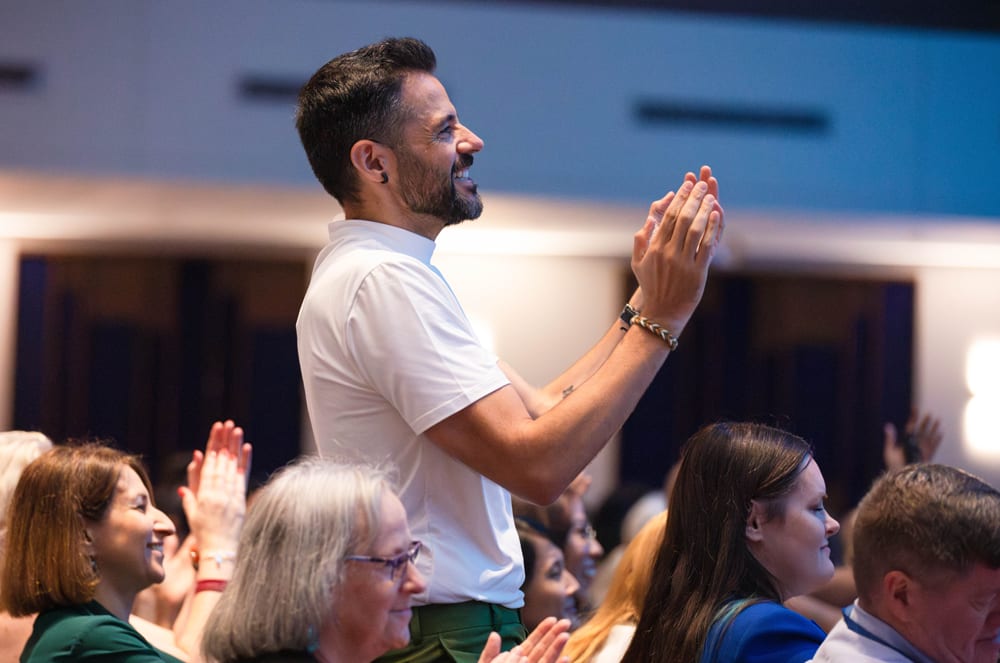
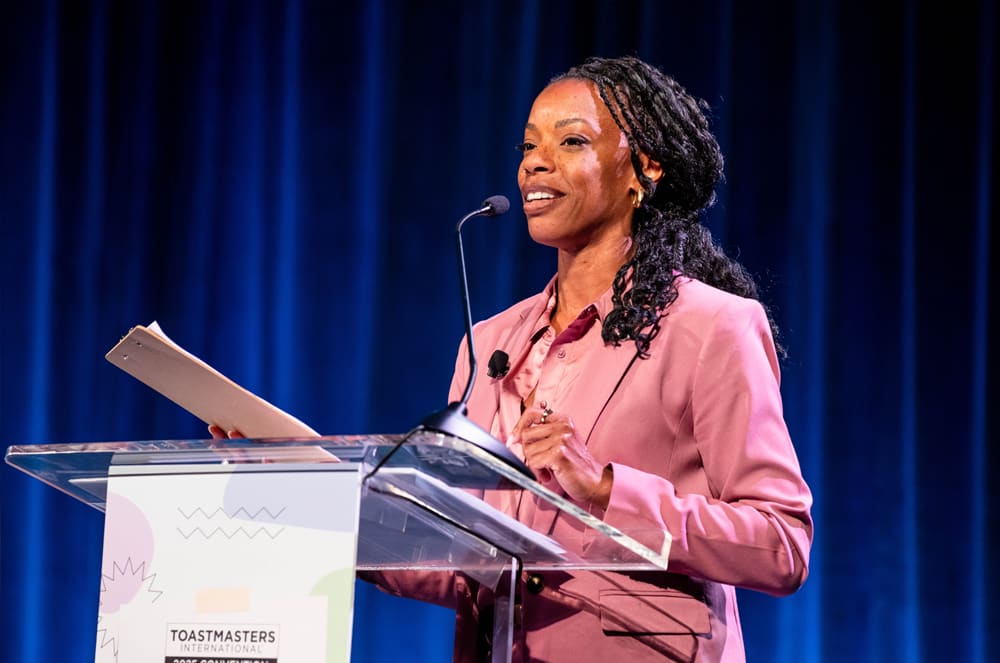
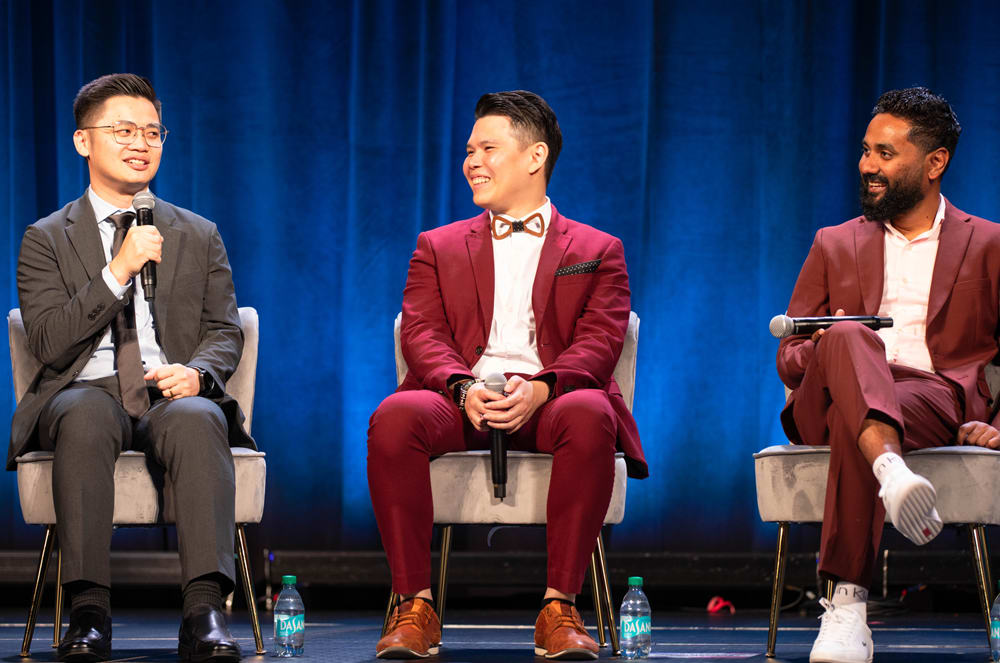
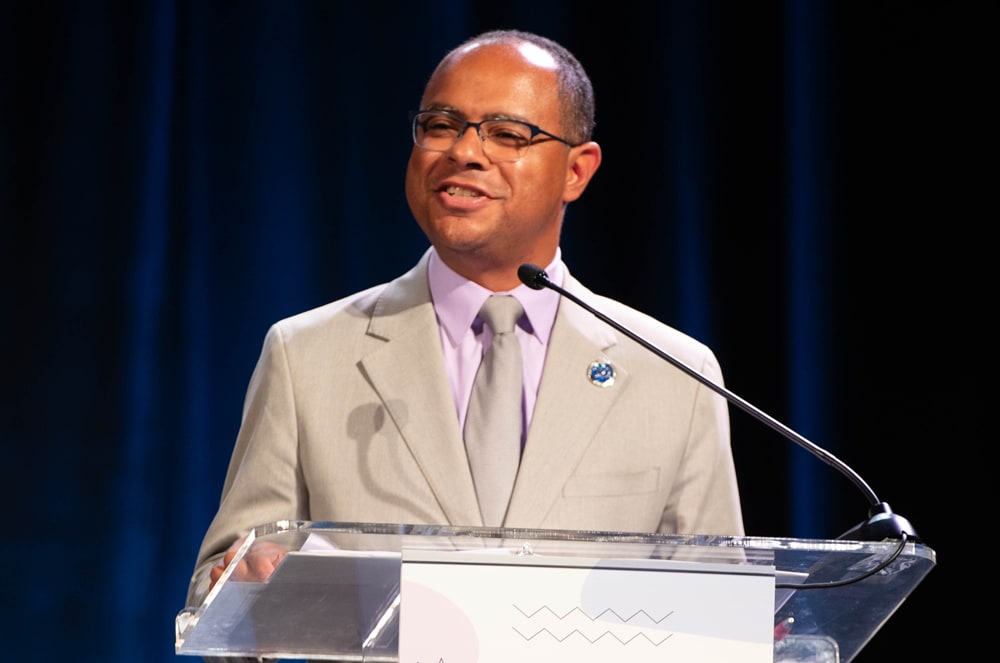
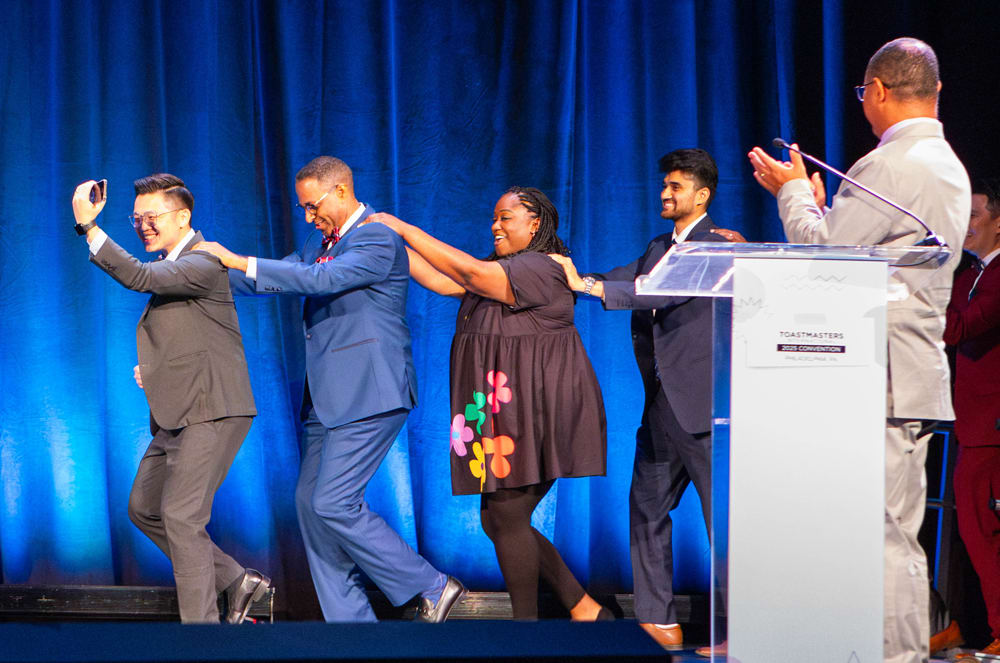
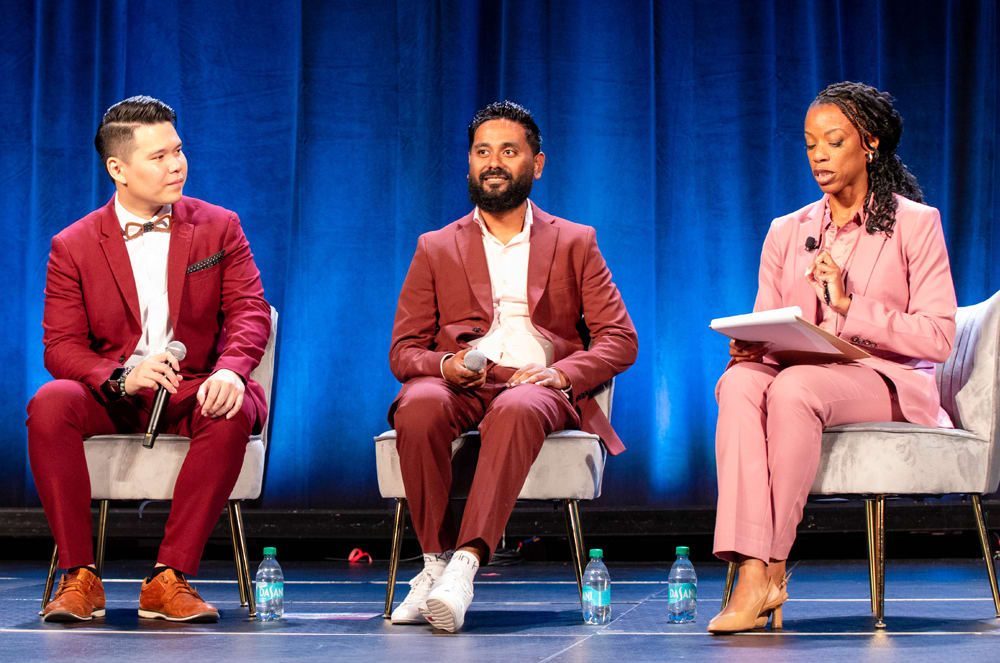

 Previous Article
Previous Article
